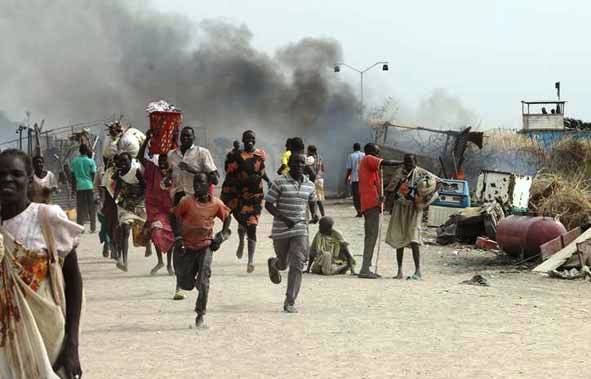South Sudan’s IDPs say Malakal UN camp fighting ‘killed 40’

March 2, 2016 (JUBA) – An investigation by South Sudanese internally displaced persons (IDPs) in Malakal camp manned by the United Nations Mission in South Sudan (UNMISS) have claimed that more than forty people died, and over 90 others were injured with many more missing following clashes involving ethnic rival armed Dinka youth and Shilluk members last month.
An internal investigation by members of Nuer and Shilluk communities at the Protection of Civilians (POC) site in the capital of the oil rich Upper Nile state, Malakal, also accused government soldiers of backing the armed Dinka youth who attacked members of the Shilluk and Nuer communities.
The statement also blamed the UN peacekeepers in Malakal for not only failing to stop the armed attackers but also allegedly killed some civilians who attempted to run to safe sites within the UNMISS compound.
The four paged investigation report leaked to Sudan Tribune also claimed the clashes started on 16 February contrary to UNMISS chronicles of the deadly clashes.
“On February 16, some clashes happened in sector 2 [of the POC] between Dinka youth on one side and Nuer/Cholo (Shilluk) on the other side but no injury reported,” partly reads the report signed by community leaders.
“This situation was communicated to UNMISS authorities to put in place preventive measures and create buffer zones but did not happen,” the statement said, adding that the first confrontation was triggered by suspicion that some Dinka IDPs were sneaking rifles and ammunition into the POC.
On the following day, 17 February, according to the civilian leaders, the fighting resumed involving the use of AK47s and machetes. They alleged that some SPLA soldiers allied to the government were involved on the second day of the fighting.
“As a result of this incident, so far 41 deaths were counted from both Nuer and Chollo (Shilluk) communities of which we have their details recorded in terms of sex, age as well as what tool killed the person,” explained the report, addressed to Deputy Special Representative for the UN’s Secretary General in South Sudan.
The community leaders’ paper did not include the number of people killed on the side of the Dinka community, although some sources in Malakal, the contested headquarters of the new Eastern Nile state, said some five people died in a government-run hospital.
The IDPs blamed the “politics” of 28 states – a decision by President Salva Kiir to expand the country from 10 states in October 2015 along ethnic lines as a driving force.
There are about 200,000 civilians sheltering at six UNMISS camps across South Sudan – including the capital Juba, Bor, Bentiu, Wau and Renk. About 50,000 of them live in Malakal’s camp.
The IDPs sought protection at the onset of war in December 2013. Malakal clashes was the second raid on UNMISS manned camps following April 2014 attack on Bor camp that left at least 40 people dead.
The IDPs in Malakal accused UN peacekeepers of negligence and demanded further investigations into their work.
“We are blaming our protectors (UNMISS force) and particularly Rwand Batt [Rwandan Battalion] as they also contributed negatively by shooting into the people running for their lives to seek safety inside the POC,” the paper added, claiming that five people lost their lives as a result of UNMISS bullets.
The United Nations peacekeepers spokesperson declined to comment when contacted for comment on this story. UNMISS and South Sudan government launched separate investigations to the cause of the clashes and their reports are not yet completed.
The IDPs also demand assistance from humanitarian relief organizations for the persons affected by the clashes, saying that some families spent days without food.
(ST)
